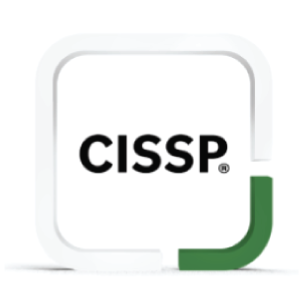Overview
The ISC² Certified Information Systems Security Professional (CISSP) certification is one of the most widely recognized and respected certifications in the field of information security. It validates a professional’s knowledge and skills in designing, implementing, and managing a best-in-class cybersecurity program.
Target Audience
The CISSP certification is intended for experienced information security professionals who play a key role in the development and management of an organization’s security policies, procedures, and programs. Ideal candidates include:
- Security consultants
- Security managers
- IT directors/managers
- Security auditors
- Security architects
- Security analysts
- Security systems engineers
- Chief Information Security Officers (CISOs)
Objectives
The CISSP exam covers eight domains. These domains cover a broad range of topics relevant to information security, ensuring that CISSP holders have a comprehensive understanding of the field.
- Domain 1: Security and Risk Management
- Domain 2: Asset Security
- Domain 3: Security Architecture and Engineering
- Domain 4: Communication and Network Security
- Domain 5: Identity and Access Management (IAM)
- Domain 6: Security Assessment and Testing
- Domain 7: Security Operations
- Domain 8: Software Development Security
Benefits
- Global Recognition and Credibility
- Industry Standard: CISSP is widely recognized as a leading certification in the information security industry. It is often considered the gold standard for cybersecurity certifications.
- Employer Trust: Holding a CISSP certification demonstrates to employers that you have a comprehensive and validated understanding of information security, which can significantly enhance your professional credibility.
- Career Advancement
- Job Opportunities: CISSP certification opens up a wide range of job opportunities in various sectors, including government, healthcare, financial services, and more. Positions such as Chief Information Security Officer (CISO), IT Director, Security Consultant, and Security Analyst often require or prefer CISSP certification.
- Higher Salaries: Certified professionals often command higher salaries compared to their non-certified counterparts. The CISSP is associated with some of the highest-paying jobs in the cybersecurity field.
- Comprehensive Knowledge
- Broad Skill Set: The CISSP covers eight domains of information security, providing a well-rounded understanding of all aspects of cybersecurity, from risk management and security architecture to software development security and incident response.
- Updated Knowledge: The certification requires continuing education, ensuring that professionals stay current with the latest trends, technologies, and best practices in the field.
- Professional Growth
- Continuing Professional Education (CPE): To maintain the CISSP certification, you must earn CPE credits, which encourages continuous learning and professional development.
- Networking Opportunities: Becoming a part of the ISC² community provides access to a global network of over 150,000 certified professionals. This network can be invaluable for career growth, knowledge sharing, and professional support.
- Enhanced Job Performance
- Improved Skills: The knowledge and skills gained from preparing for and maintaining the CISSP certification can directly improve job performance. Certified professionals are better equipped to develop and manage an organization’s security infrastructure.
- Strategic Insight: CISSP-certified individuals often have a deeper understanding of how security integrates with business objectives, enabling them to contribute more strategically to their organizations.
- Compliance and Risk Management
- Regulatory Compliance: Many regulations and standards, such as GDPR, HIPAA, and PCI DSS, require organizations to have certified professionals on staff. The CISSP certification helps organizations meet these compliance requirements.
- Risk Mitigation: CISSP-certified professionals are trained to identify, assess, and mitigate risks, enhancing an organization’s overall security posture and reducing the likelihood of security breaches.
- Employer Benefits
- Enhanced Security Posture: Employers benefit from having CISSP-certified professionals on their team as it strengthens the organization’s security measures and reduces the risk of cyber threats.
- Competitive Advantage: Organizations with CISSP-certified employees can gain a competitive advantage by demonstrating a commitment to cybersecurity excellence to clients, partners, and regulators.
- Recognition by Government and Industry
- DoD Directive 8570/8140: The CISSP certification meets the requirements for various job roles under the U.S. Department of Defense (DoD) Directive 8570/8140, making it essential for professionals working in government or defense sectors.
- Industry Recognition: CISSP is recognized and endorsed by leading organizations and government bodies worldwide, further enhancing its value and credibility.
- Overall, the CISSP certification is a valuable asset for information security professionals looking to advance their careers, enhance their knowledge and skills, and contribute more effectively to their organizations’ cybersecurity efforts.
Prerequisites
- Five Years of Experience: Candidates must have a minimum of five years of cumulative, paid work experience in two or more of the eight domains of the CISSP Common Body of Knowledge (CBK).
- Education Waiver: One year of the required experience can be waived if the candidate holds a four-year college degree (or regional equivalent) or an additional credential from the ISC² approved list. This means candidates with a qualifying degree or credential need four years of professional experience instead of five.
Exam Details
The ISC² Certified Information Systems Security Professional (CISSP) exam is a comprehensive assessment designed to test a candidate’s knowledge and skills in information security across a wide range of domains. Here are the detailed aspects of the CISSP exam:
Exam Format
- The CISSP exam consists of 100-150 questions.
- The questions are multiple-choice and advanced innovative questions (e.g., drag and drop, hotspot, and scenario-based questions).
- The exam duration is 3 hours.
- Candidates need to score 700 out of 1000 points to pass the exam.
Class Duration
5 days

